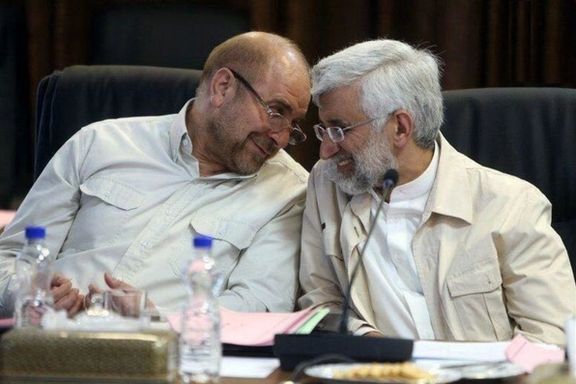Ghalibaf, who came third in the first round of the snap elections with nearly one-third of Jalili's votes, was eliminated, with Jalili representing 'revolutionaries' in the final round. He urged his supporters to vote for Jalili in the July 5 runoff to avoid dividing the votes of the 'revolutionary front.'
However, some of Ghalibaf’s supporters and campaign members openly endorsed Pezeshkian instead of Jalili who they said had no executive experience or viable plans for running the country.
Jalili’s supporters on social media accuse Ghalibaf of “hypocritically” announcing that he would vote for Jalili but refusing to mobilize his campaign capabilities including social media networks in his support.
Journalist Abdolrahim Ansari who supported Jalili scolded Ghalibaf in a tweet on Sunday telling him that he made no attempt to help Jalili by shifting his votes to him.
“We must not allow their treachery to be forgotten … This revolution should no longer be harmed by mudslinging and division,” he wrote.
Jalili and Ghalibaf’s supporters had fought an intensive media and social media battle for months, particularly before the parliamentary elections of March 1 during which both sides extensively made allegations of corruption and fraud against each other.
Since the announcement of his defeat, some Jalili supporters have also defiantly slammed the ultra-hardliner election watchdog, the Guardian Council, whose members are appointed by Supreme Leader Ali Khamenei.
They say the Council paved the way for Pezeshkian’s victory by pitching him against at least four hardliners and one conservative, causing the revolutionary front’s votes to be divided between the candidates.
Mohammad Mannan-Raisi, a lawmaker from Qom charged that the make-up of the approved candidates could not have been more “in reformists’ favor” to guarantee their candidates’ win.
Jalili supporters’ anger against the Guardian Council was also reflected in a tweet on the day of the runoff elections by Mohammad-Mehdi Fatemi-Sadr, a well-known Qom-based cleric and ardent Jalili supporter.
The Guardian Council should expect repercussions, he tweeted in a highly defiant language. Such open defiance of the Guardian Council could be interpreted as defiance of Khamenei. However, these hardliners never mention that the Council barred key candidates in the 2021 election, all but guaranteeing a win for their favorite man, Ebrahim Raisi.
Jalili who is not an official member of any political party or group was backed by the ultrahardliner Paydari (Steadfastness) Party led by Sadegh Mahsouli, a business tycoon and interior minister under populist Mahmoud Ahmadinejad as well as the recently established Jebhe-ye Sobh Iran. The latter, often referred to as MASAF, is a political group led by hardliner politician and theorist Ali-Akbar Raefipour.
The Paydari (Steadfastness) Party has its appendages in all government institutions including the parliament where their members formed a very influential minority in the past few years. They have often taken a leading role amid the weak presence of established conservative and reformist parties.
Paydari and MASAF are believed to have considerable influence among the Basij militia of the Revolutionary Guards (IRGC). The top brass of the IRGC, however, are widely claimed to have been behind Ghalibaf, a former commander of the IRGC’s air force.
Many of the top figures in the Paydari Party were Ahmadinejad allies who denounced him following his eleven-day standoff with Supreme Leader Ali Khamenei in 2011. They and other Khamenei loyalists dubbed Ahmadinejad and those who remained loyal to him “deviant” after the incident.
“It’s still the beginning. We will not let you be until we disgrace the Paydari grouplet and MASAF. You and your group are dangerous for the Revolution,” a Ghalibaf supported tweeted Monday.







